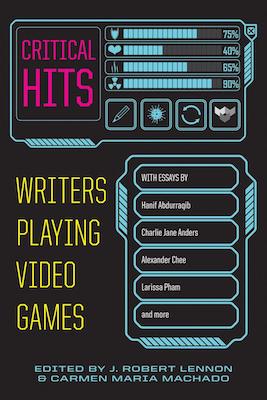March 20, 2020, Animal Crossing: New Horizons Freed. Just days after marking the beginning of the COVID-19 pandemic and shutting down much of the world, millions of people are moving to a virtual world where the disease is not spreading and they can pay off the construction costs of their homes. I fell into it. own pace.

It felt like more people were playing and talking about video games than ever before.Therefore it makes sense Critical Hit: Writers Playing Video Games It was born out of conversations during quarantine. But escapism and solitary play only scratch the surface of what the 18 essays in this anthology cover. With a refreshing diversity of both form and approach to thinking about games, each work emerges from a place of fact and understanding. Video games are art and deserve both our pleasure and curiosity. It makes sense to juxtapose comics and surprising personal stories with thoroughly researched critical works. Video games are vast and diverse. critical hit It complements the hugeness of the field.
We spoke with J. Robert Lennon and Carmen Maria Machado via Zoom and email to discuss the creation of the collection and their own relationship with video games.
Summer Farrar: How did this project come about? How did you come up with the topic of video games and the partnership with your co-editor?
Carmen Maria Machado: At the beginning of COVID-19, Gray Wolf had a really nice little Zoom hangout where we all caught up. He's just talking about what he's been doing for quarantine and things like that. For me it was video games. John is obviously a big fan of video games as well, so we were all talking about that. And my editor Ethan commented on it: Are there any writers who write about video games?“ And at some point, people started following more intently. they told us: “I actually looked into it and it seems that there is nothing else similar to this, but would you be willing to co-edit it?”
J. Robert Lennon: Yeah, I remember someone on Zoom saying, “Maybe we should do an anthology, haha,” and we were like, “We should definitely do that, haha.” And before we knew it, they started saying: you We should do an anthology! ” Ander Monson was also involved in these conversations, and he was the natural person to ask for an essay. His article on “Predator'' was one of the first articles he received. Thank you to the Wolves for implementing this idea and believing in us. To make it a reality.
SF: What was the prep work like for the anthology, especially since video game writing is such a new creative field?
CMM: I've edited anthologies before, but only to win awards. The best American science fiction fantasy. But this was a completely different animal. So many of us joined in to brainstorm a list of other writers we know who are big fans of video games. I was also very intentional about featuring a wide range of representation in this book, not only in terms of author types, but also in gamer types, both hardcore and casual gamers. (Personally, I feel like I'm somewhere in the middle.) We were interested in what people would say about how games fit creatively into a writer's life. How do video games fit into your creative practice? Or do they fit in? Or are they just a kind of stress reliever?
CMM: Can you talk about the choice to do a curated anthology rather than an open call?
JRL: There was no doubt that an open call was being considered, but there were a number of writers who seemed promising, so I thought I should contact them first and see what would happen. Personally, I expected most of the writers we contacted to say no and to spend a lot of time reading the calls. However, the response to our email was overwhelming. There seemed to be a lot of desire to write about games, and most people we asked had great stuff to tell us.
SF: Eleanor Henderson’s essay “The Great Indoorsmen” was one of my favorites and was a really refreshing take on it. There's a lot of cringe-worthy talk and unnuanced discussion about video games that just irritates me. Well, what's next? Were there any stories you wanted to avoid or themes that people brought up that surprised you?
CMM: We said early on that what we wanted to avoid was the problem of video games being art.They are teeth art. We're not arguing about that. “Are video games art?” This is a question that brings to mind the question of literature and genre. And I hate conversation, it drives me crazy. It's such a trivial issue that I get tired of repeating the same thing over and over again. When you think about this, it's like opposing sides are fighting each other, which is not fun. It doesn't help. We assume that video games are art. We know they are.
We were interested in what people say about how games fit creatively into a writer's life.
JRL: I agree, the first person in the literary world to try to answer that question was Tom Bissell, and I think his book is great. extra live. That was in 2010. Since then, I've talked about the game with many writers, and everyone has ignored the topic. We all know that games are an important art form and influence our writing. There are very few faculty members in my department who are producing academic literature on games. The ship has sailed. We wanted to jump into the next phase of a popular conversation.
SF: Do you feel like your relationship with games has changed through editing the anthology?
CMM: We decided early on that John would contribute a reprint essay.after that [the team was like], would you like to write your own essay? Do you want to reprint something or write something new? So I thought I'd do an intro. it's okay. I had a few small theories and ideas about the game, but nothing I was ready to develop into a full essay. I decided to take a more exploratory approach. I look back on my own life, childhood, and adolescence.I ended up digging deeper into myself. [history] And where certain games were anchored to events in my life. As with all media, books, movies, albums, etc., you might think, “Oh, yeah.” I remember reading it during a bad breakup. Or whatever. So I used gaming as a way to organize my life. It was a really nostalgic, fun, sad, and interesting feeling.
JRL: I've always felt like my thoughts were part of a global conversation when it came to books and literature. I read book reviews, went to school, and everyone around me was talking about books. There was an established literacy culture in which to participate. My interest in gaming has always felt private. Maybe it's because no one in authority would pay me to talk about games. It was usually like, “Okay, John, enough about Ms. Pac-Man.” Reading these essays made me, for the first time, feel like I was part of a community of people thinking and feeling about this art form, and that playing the game felt more collaborative, even if I was doing it alone. Now it seems like. Now, when I spend 20 minutes in Spiral Abyss, Genshin, Thinking of Larissa! When I dive back into Red Dead, I think of Hanif.
SF: Are you interested in writing more about games in the future?
CMM: Oh, sure. I mean, to be honest, being able to work in video games and write for games is definitely a big goal.
JRL: Yeah, it's interesting that Carmen directly discussed the issue of writing about games versus writing about games themselves. I feel the same way. There's a lot of work to do, but if someone asked me to write a game, I'd put everything aside and just go for it.
SF: Does the act of playing games contribute to your writing? I mean, I'm sure it can hurt at times.
JRL: my last novel, section, This was definitely a direct response to the years I spent re-immersing myself in the game after a long hiatus. I love how puzzle games and open-world games are structured, how they define the boundaries of the world and evoke emotions, and what kind of imaginative control players and readers have over their creations. I absorbed a lot about it. section It's basically a game version of the concept of trauma and loss. It also made me realize retrospectively how much the games of my youth influenced my early work, and more broadly, how many of my literary influences aren't literary at all.
CMM: In some cases, it's similar to watching a movie or reading a book. It's not exactly the same, but it plays into the story. Some games are more artistically stimulating than others. Other times, you're just playing a game that isn't very interesting story-wise, but is fun in other ways. Sometimes they help me practice, sometimes they don't. But either way, I really love playing them. You must be careful not to fall into the hole. It's easy to waste time.
SF: What kind of life do you want this anthology to have?
CMM: The strange thing about being a writer and an editor is that you have no way of knowing what kind of life a book will take. So I don't know. In short, I want gamers to read it. I want people who are not gamers to read this too. I hope people tell me that.
JRL: Games journalism for gamers has been around for decades, and research about games is a vibrant and exciting field, but literary essays about games for a general audience have been something of a subgenre without a place. For example, where else could I have published Nana's essay about her father's death? Disco Elysium, Or Elissa talking about play. the last of us While thinking about the problems of being a parent? It was a joy to create a space for these great writers to say things they might not have otherwise done.
SF: What are you doing now?
CMM: tears of the kingdom. What is everyone obsessed with from Xbox?star field? I don't have an Xbox, but this game is really cool.? I'm considering purchasing an Xbox.
JRL: Oh yeah, my reward for finishing the first draft of the novel I'm working on will be buying an Xbox and playing it. star field. Maybe it was a good thing that the work wasn't finished on release day, but I've been beaten by Bethesda before. It is best to keep it cool until the insects are gone.Since I started working on it critical hitI got a Steam deck and have been playing a lot of small games from indie developers: Meredith Gran's Perfect Tizeby Lucas Pope Return of Obra DinnSam Barlow's immortality. It's like a parallel anthology of small, wonderful things.


